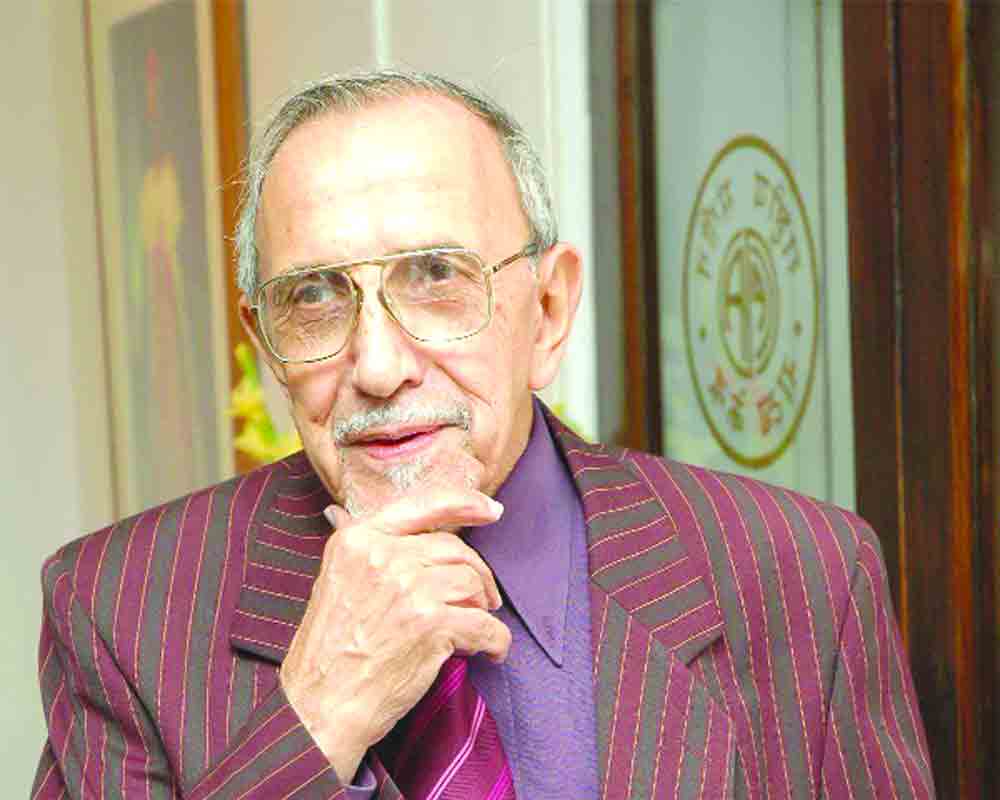Uma Nair fondly recalls the other side of the life and influence of prominent theatre director and artist, Ebrahim Alkazi
One important contribution that Tyeb Mehta and some of his confrères made to Indian art is that they have striven to banish sentimentalism from their works. To my mind, the arch-enemy of Indian art and culture, past and present, is this quagmire of sentimentalism.”
Extract from a talk delivered by Ebrahim Alkazi at the opening of Tyeb’s exhibition in October 1959.
Alkazi, founder and director of the Art Heritage Gallery in New Delhi passed away on August 4, 2020. Known to the world of theatre with magnificent productions, Alkazi was also one of India’s first collectors of Indian contemporary art. He built his reputation in the capital city of Delhi as a builder of institutions, a revered theatre pedagogue, a true champion of artists, a philatelic art collector, a brilliant curator of exhibitions and a mentor to generations of actors on the stage and screen.
A close friend of both Tyeb and Francis Newton Souza, founding member of the Progressive Artist's Group based in Mumbai, Alkazi had a keen eye for contemporary practises and art heritage; he functioned like an avant-garde space that had an eye on the best in the country. Long before the art world woke up to Tyeb’s works, it was Alkazi who bought his Kali (1989), said Tyeb to a critic in 2005. Tyeb respected and spoke highly of his friend, “Alkazi was a brilliant artist too, he understood Western art genres and had done many works. I wonder where they are...”
Alkazi and Souza
Among his historic collection of India’s finest — collected for the Alkazi Foundation — the best was arguably his collection of Souzas. In 1996, the Shridharani in Delhi hosted an epic solo exhibition of Souza, his roommate and friend from his London days.
Souza’s relationship with drawing was described by Alkazi, Souza’s long-time friend and patron, as being ‘as natural and essential to him as breathing...his only link with life in times of distress’.
Alkazi had poignant stories to share of his relationship with Souza. Souza’s epic work Family (1956), was one among many kept on a bridge in Goa. He found Souza to be exceptional as an artist.
One recalls Alkazi’s words of the early years in London, “I remember taking a handcart full of Souza’s paintings and going up and down Oxford Street and Bond Street trying to sell them.”
Alkazi was friends with the Progressive Artist’s Group but he was critical as well and pulled no punches when he had to speak the truth.
In 1954 after a Progressive Artist’s Group show, Alkazi questioned their existence, writing in The Theatre Unit Bulletin, “What holds the group together is not a common aesthetic, but a herd instinct of self-preservation and security against the feeble attacks of an indifferent public.”
A critical visual eye
Alkazi was known not just for his critical visual eye and theatrical mastery, his life was a testimony of his deep interest in the relationship between art and theatre. He received the ‘Living Treasures of Bombay Award’ in recognition of his contribution to the cultural life of the city of Mumbai. As the director of the Art Heritage Gallery at Triveni Kala Sangam, he was one of the first promoters of artists such as Souza and Maqbool Fida Husain.
Opening Lines
Last year, at Shridharani and Art Heritage in Triveni, Alkazi’s early works, completed more than 60 years ago, came alive in Opening Lines. Curated by Ranjit Hoskote, who spent two years putting together the masterpiece in curation, with the stupendous design dictated by Amal Allana — Alkazi’s daughter — who said she found 99 works on paper, carefully knotted in a bundle.
The exhibition was a melange of precious memories and souvenirs. Old photographs of Akbar Padamsee, VS Gaitonde, MF Husain and Davierwalla, brought back the beauty of relationships shared and cherished — all of them were collaborators in his productions.
Alkazi had a deep understanding of cubist, abstract, realist modes of translating the human figure and face, while also trying his hand at sculptures. Opening Lines educated, informed and proved that Alkazi, was one of India’s greatest collectors because he knew his art. The only oil-on-canvas in the exhibition, a magnificent self-portrait, was the symbol of expression, elegance and emotive evocation. Observation and a finer sense of deeper aesthetics are what defined Alkazi as an astute and accurate artist. His lines were a lexicon of lithe langur, his thoughts flowing in liquid delight.
Astute collector, not a trophy hunter
As a collector, Alkazi was no trophy hunter. He was a true blue-blooded collector. He knew the permutations of art as an investment and did not believe in the art of boasting. At best, he was an archivist/documentarian who revered history, fed off literature and built on the wisdom of ‘all the world being a stage in which men and women are merely players.’
His life, long after he gave up the stage, was about art and inner journeys; his integrity as a patron is what set him apart from his peers. India lost a distinguished, robust collector who built his empire in silence.


























